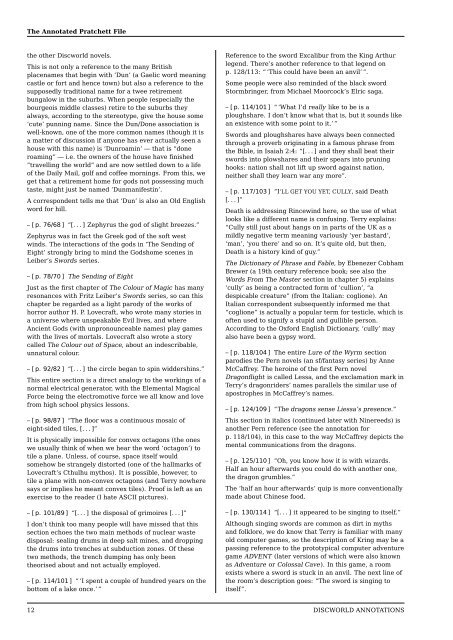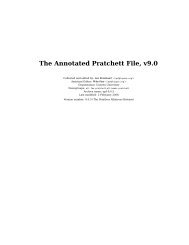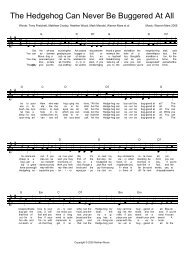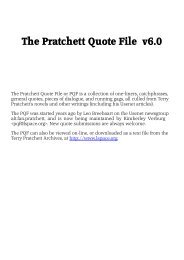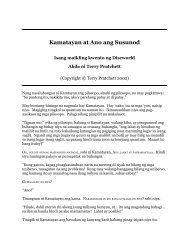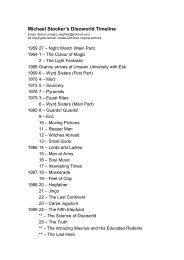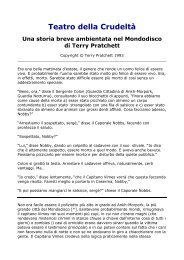The Annotated Pratchett File, v9.0 - The L-Space Web
The Annotated Pratchett File, v9.0 - The L-Space Web
The Annotated Pratchett File, v9.0 - The L-Space Web
You also want an ePaper? Increase the reach of your titles
YUMPU automatically turns print PDFs into web optimized ePapers that Google loves.
<strong>The</strong> <strong>Annotated</strong> <strong>Pratchett</strong> <strong>File</strong><br />
the other Discworld novels.<br />
This is not only a reference to the many British<br />
placenames that begin with ‘Dun’ (a Gaelic word meaning<br />
castle or fort and hence town) but also a reference to the<br />
supposedly traditional name for a twee retirement<br />
bungalow in the suburbs. When people (especially the<br />
bourgeois middle classes) retire to the suburbs they<br />
always, according to the stereotype, give the house some<br />
‘cute’ punning name. Since the Dun/Done association is<br />
well-known, one of the more common names (though it is<br />
a matter of discussion if anyone has ever actually seen a<br />
house with this name) is ‘Dunroamin’ — that is “done<br />
roaming” — i.e. the owners of the house have finished<br />
“travelling the world” and are now settled down to a life<br />
of the Daily Mail, golf and coffee mornings. From this, we<br />
get that a retirement home for gods not possessing much<br />
taste, might just be named ‘Dunmanifestin’.<br />
A correspondent tells me that ‘Dun’ is also an Old English<br />
word for hill.<br />
– [ p. 76/68 ] “[. . . ] Zephyrus the god of slight breezes.”<br />
Zephyrus was in fact the Greek god of the soft west<br />
winds. <strong>The</strong> interactions of the gods in ‘<strong>The</strong> Sending of<br />
Eight’ strongly bring to mind the Godshome scenes in<br />
Leiber’s Swords series.<br />
– [ p. 78/70 ] <strong>The</strong> Sending of Eight<br />
Just as the first chapter of <strong>The</strong> Colour of Magic has many<br />
resonances with Fritz Leiber’s Swords series, so can this<br />
chapter be regarded as a light parody of the works of<br />
horror author H. P. Lovecraft, who wrote many stories in<br />
a universe where unspeakable Evil lives, and where<br />
Ancient Gods (with unpronounceable names) play games<br />
with the lives of mortals. Lovecraft also wrote a story<br />
called <strong>The</strong> Colour out of <strong>Space</strong>, about an indescribable,<br />
unnatural colour.<br />
– [ p. 92/82 ] “[. . . ] the circle began to spin widdershins.”<br />
This entire section is a direct analogy to the workings of a<br />
normal electrical generator, with the Elemental Magical<br />
Force being the electromotive force we all know and love<br />
from high school physics lessons.<br />
– [ p. 98/87 ] “<strong>The</strong> floor was a continuous mosaic of<br />
eight-sided tiles, [. . . ]”<br />
It is physically impossible for convex octagons (the ones<br />
we usually think of when we hear the word ‘octagon’) to<br />
tile a plane. Unless, of course, space itself would<br />
somehow be strangely distorted (one of the hallmarks of<br />
Lovecraft’s Cthulhu mythos). It is possible, however, to<br />
tile a plane with non-convex octagons (and Terry nowhere<br />
says or implies he meant convex tiles). Proof is left as an<br />
exercise to the reader (I hate ASCII pictures).<br />
– [ p. 101/89 ] “[. . . ] the disposal of grimoires [. . . ]”<br />
I don’t think too many people will have missed that this<br />
section echoes the two main methods of nuclear waste<br />
disposal: sealing drums in deep salt mines, and dropping<br />
the drums into trenches at subduction zones. Of these<br />
two methods, the trench dumping has only been<br />
theorised about and not actually employed.<br />
– [ p. 114/101 ] “ ‘I spent a couple of hundred years on the<br />
bottom of a lake once.’ ”<br />
Reference to the sword Excalibur from the King Arthur<br />
legend. <strong>The</strong>re’s another reference to that legend on<br />
p. 128/113: “ ‘This could have been an anvil’ ”.<br />
Some people were also reminded of the black sword<br />
Stormbringer, from Michael Moorcock’s Elric saga.<br />
– [ p. 114/101 ] “ ‘What I’d really like to be is a<br />
ploughshare. I don’t know what that is, but it sounds like<br />
an existence with some point to it.’ ”<br />
Swords and ploughshares have always been connected<br />
through a proverb originating in a famous phrase from<br />
the Bible, in Isaiah 2:4: “[. . . ] and they shall beat their<br />
swords into plowshares and their spears into pruning<br />
hooks: nation shall not lift up sword against nation,<br />
neither shall they learn war any more”.<br />
– [ p. 117/103 ] “I’LL GET YOU YET, CULLY, said Death<br />
[. . . ]”<br />
Death is addressing Rincewind here, so the use of what<br />
looks like a different name is confusing. Terry explains:<br />
“Cully still just about hangs on in parts of the UK as a<br />
mildly negative term meaning variously ‘yer bastard’,<br />
‘man’, ‘you there’ and so on. It’s quite old, but then,<br />
Death is a history kind of guy.”<br />
<strong>The</strong> Dictionary of Phrase and Fable, by Ebenezer Cobham<br />
Brewer (a 19th century reference book; see also the<br />
Words From <strong>The</strong> Master section in chapter 5) explains<br />
‘cully’ as being a contracted form of ‘cullion’, “a<br />
despicable creature” (from the Italian: coglione). An<br />
Italian correspondent subsequently informed me that<br />
“coglione” is actually a popular term for testicle, which is<br />
often used to signify a stupid and gullible person.<br />
According to the Oxford English Dictionary, ‘cully’ may<br />
also have been a gypsy word.<br />
– [ p. 118/104 ] <strong>The</strong> entire Lure of the Wyrm section<br />
parodies the Pern novels (an sf/fantasy series) by Anne<br />
McCaffrey. <strong>The</strong> heroine of the first Pern novel<br />
Dragonflight is called Lessa, and the exclamation mark in<br />
Terry’s dragonriders’ names parallels the similar use of<br />
apostrophes in McCaffrey’s names.<br />
– [ p. 124/109 ] “<strong>The</strong> dragons sense Liessa’s presence.”<br />
This section in italics (continued later with Ninereeds) is<br />
another Pern reference (see the annotation for<br />
p. 118/104), in this case to the way McCaffrey depicts the<br />
mental communications from the dragons.<br />
– [ p. 125/110 ] “Oh, you know how it is with wizards.<br />
Half an hour afterwards you could do with another one,<br />
the dragon grumbles.”<br />
<strong>The</strong> ‘half an hour afterwards’ quip is more conventionally<br />
made about Chinese food.<br />
– [ p. 130/114 ] “[. . . ] it appeared to be singing to itself.”<br />
Although singing swords are common as dirt in myths<br />
and folklore, we do know that Terry is familiar with many<br />
old computer games, so the description of Kring may be a<br />
passing reference to the prototypical computer adventure<br />
game ADVENT (later versions of which were also known<br />
as Adventure or Colossal Cave). In this game, a room<br />
exists where a sword is stuck in an anvil. <strong>The</strong> next line of<br />
the room’s description goes: “<strong>The</strong> sword is singing to<br />
itself”.<br />
12 DISCWORLD ANNOTATIONS


